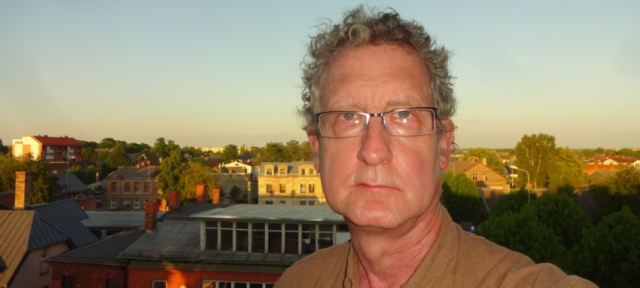Michael Strmiska 78S Prepares for Fulbright Fellowship in Lithuania

Strmiska is preparing to teach at Vilnius University in spring 2025. The Hampshire alum will lead the course New Asian Religious Movements while conducting research on religious movements and the status of the Roma minority in Lithuania.
Since its establishment, in 1946, the Fulbright Program has given more than 400,000 students, scholars, teachers, artists, and scientists the opportunity to study, teach, conduct research, exchange ideas, and contribute to finding solutions to shared international concerns.
“My exposure to the open, inquiry-based model of education at Hampshire has made me a teacher who strives to encourage students to develop their own voices and interests,” says Strmiska, who is professor of global studies at SUNY Orange.
We spoke with him about his upcoming Fulbright Fellowship, career, and Hampshire experience.
What did you study? Did that change during your time at the College?
I started with broad interests in psychology, Asian philosophy, and comparative religion. I eventually decided to focus on psychology as I saw that as offering a more concrete path, thinking I could one day work as a therapist or counselor. For my Div III, I studied alternative treatments for schizophrenia.
I did have experience working in the mental health field while at Hampshire and went into this line of work after graduation, though I eventually left the field.
How did your Hampshire experience impact the work you’re doing now?
In my 16 years teaching in a somewhat conservative educational institution, a community college centered on job training in which most professors strive to be as apolitical as possible, my Hampshire experience gave me the backbone and awareness to stand up in the classroom for progressive values and critique fascistic tendencies in contemporary politics in the U.S. and abroad.
Tell us more about your path to teaching.
I attended graduate school for religious studies with a focus on Indian religion and Scandinavian mythology, first at the University of Wisconsin-Madison and then at Boston University, achieving a Ph.D. in 2002 and going on to a career teaching world history and religious studies at multiple institutions in America and abroad.
What inspired the application for this Fulbright?
I’ve had a longstanding interest in the Baltic region and had received Fulbright grants to teach at universities in Lithuania in the 2004–05 academic year and in the adjoining country, Latvia, in spring 2020. My stay in Latvia lengthened to a year and a half due to the COVID crisis, when I discovered that my American college would be conducting all classes online in 2020–21, which I chose to do from an apartment in Riga rather than my apartment in Middletown, New York.
What will you teach in Lithuania?
I’ll be teaching a course on a topic I’ve been involved with for the last 20 years, the study of New Religious Movements (NRMs), in this case looking at NRMs in Asian countries or that have arisen in Asia and spread to other parts of the world. The course will make use of materials I developed back in the spring of 2015, when I taught a class at Hampshire titled “Modern Paganism and New Religious Movements.”



